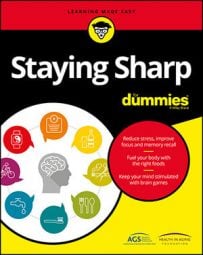The old adage "use it or lose it" applies to your memory. Using it is fun and rewarding. So why just sit there not using it and end up losing it?
Working your memory systems
Whatever your age or background, you can improve your memory skills using numerous memory techniques, such as mnemonics (cues that you can use to remind yourself of information). Some mnemonic techniques include peg, loci, and the story and link systems.Mnemonics can remind you by associating a letter or number to information. For example, if you're trying to remember the names of the Great Lakes, use the first letter as a cue. By using the word homes, you can remember each of the lakes: Huron, Ontario, Michigan, Erie, and Superior.
Priming: To retrieve "lost" information
A process known as priming can also help you remember. When you're priming memories, you remember some related things in hopes of remembering the "lost" information. For example, if you forget where you've put your keys, you retrace your steps. You try to remember where you were and what you were doing, priming out the memory of where you left your keys.You can structure information all sorts of ways to help you remember it. If you organize the information by serializing, chunking, or even rhyming it, you can remember it.
When you chunk information, you break it up into bite-size segments that are easier to remember. For example, when you learned to remember your social security number, you didn't memorize it as one long chain of nine numbers; you broke it up in three chunks: the first three numbers, the middle two, and the final four.
Associating: When you can't remember the person's name
If you're like most people, you've felt embarrassed because you've blocked on a person's name. You've probably seen a few people at the supermarket and found that, though they look familiar, you can't remember their names.You can help your ability to remember a person's name by associating it with one or more of the following:
- Her occupation
- A physical characteristic, such as height or weight
- A unique facial feature, such as a sharp chin or red hair color
- The way she moves

